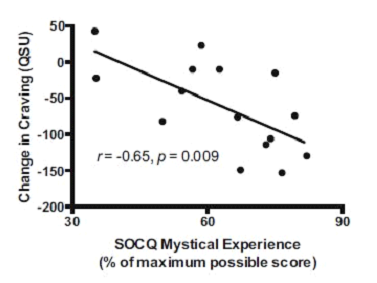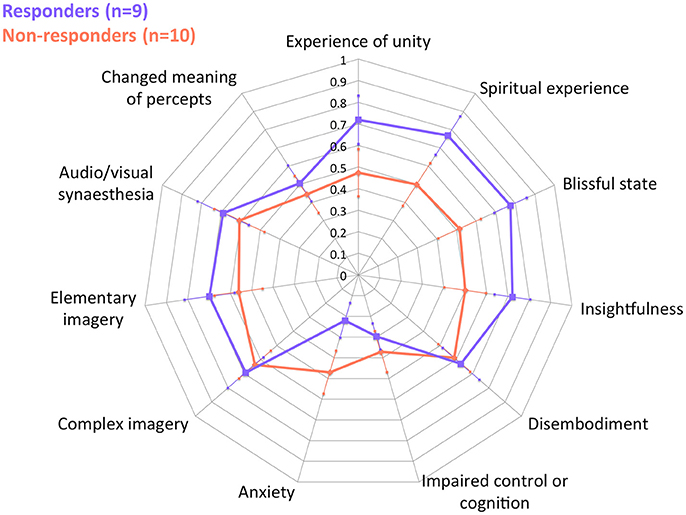Spirituality and the Healing Potential of Psychedelics
How important is the mystical experience in the long-term benefits of psychedelic-assisted therapy?
Recent research on psychedelic-assisted psychotherapy has shown the great promise of this therapeutic approach for the treatment of numerous mental health conditions. Instead of medicating people away from their emotions, it promotes a reconnection with them. In the first clinical study of psilocybin-assisted therapy for treatment resistant depression, carried out by the Beckley/Imperial team, we found that, for the first time in the history of psychiatry, the mystical experience lies at the very heart of treatment efficacy:
Patients who demonstrated the greatest improvement in their depression scores (blue line – 9 responders) were those who had undergone a greater mystical experience during the psychedelic intervention. Lower ‘peak’ experience were reported in those with weaker therapeutic response (10 ‘non-responders’).
Similarly, in a study of psilocybin-assisted therapy for smoking cessation carried out in collaboration between Johns Hopkins University and the Beckley Foundation, smoking cessation outcomes were significantly correlated with measures of mystical experience on session days, as well as retrospective ratings of the personal meaning and spiritual significance of psilocybin sessions.
 Reductions in nictotine cravings were significantly associated with strength of self-reported mystical experiences
Reductions in nictotine cravings were significantly associated with strength of self-reported mystical experiences
Participants’ comments after psilocybin-assisted therapy
Feelings of gratefulness, a great (powerful) remembrance of humility… of my experience of being, the experience of my being in and within the infinite.
Not at all religious but significant in motivating me to nurture my spiritual life.
It changes what I believe… We are all one and divine.
The awareness that all is one and then the realization that I am an integral piece of the one’s puzzle.
Oneness with universe; being forgiven.
Rich joy and awe. My body melting and becoming one with the universe felt both painless and profound… Feeling complete as a person and physically a part of all things.
There is a meaningful presence that humbles any human heart.
Simultaneously being aware and saturated in the majesty of existence.
Seeing God speaks for itself; seeing and feeling forever was like traveling through space-time.
The sessions permitted me to go inside and see and feel the nature of the mind.
Recognizing the source and manifestation of visions… source of unconscious content.
I believe I channeled the power of the Goddess and that I hold that power in me. I believe she exists everywhere, and I look for her to add spark, life, and joy to everyday ordinary situations.
Might providing a spiritual framework to psychedelic-assisted therapy further improve the long-term therapeutic outcomes?
Although spirituality has been related to increases in both resilience and positive emotions, the field of transpersonal psychology remains largely under-recognised.
Mindfulness-based therapy is the first successful attempt at reintegrating spiritual practices with psychiatry. However, it often suffers from the same limitation as many other imported contemplative practices, namely that it has lost its essential, meaningful, spiritual component in translation from the Eastern to the Western world.
The same appears to be happening with psychedelic-assisted therapy. Psychedelics were originally used as a sacrament, by the Mazatecs of Oaxaca or the indigenous tribes of the Peruvian Amazon, for instance, but this dimension has largely been lost in our modern revisiting of the medical use of these compounds. The therapies proposed to accompany this unique experience – despite being reminiscent of certain aspects of Eastern philosophies – lack the sense of sacredness, transcendence and divinity, that is inherent to the psychedelic experience.
Providing a spiritual framework might considerably improve the therapeutic outcome of psychedelic-assisted therapy, improving long-term wellbeing by increasing the likelihood of a deeply transformative mystical experience, and helping to integrate it into everyday life.
Now that the field of psychiatry is contemplating its own limitations and witnessing the great potential of psychedelic-assisted therapy, the time may be ripe for the reintegration of spirituality into healthcare, as a source of healing, resilience, and flourishing.
Proposed Work
The Beckley Foundation is working on the development of a multidisciplinary research programme whose aim will be two-fold:
1) To understand and evaluate the role that spirituality may have to play in mental health, particularly in association with psychedelic-assisted therapy.
2) To work with spiritual leaders and psychiatrists to create a unified framework for introducing spirituality into therapy.
Research Highlights
Podcast
- All
Links
- All
Support
- All
BIPRP
- All
Science Talk
- All
Amanda's Talks
- All
- Video Talk
- Featured
- 2016 Onwards
- 2011-2015
- 2010 and Earlier
- Science Talk
- Policy Talk
One-pager
- All
Music
- All
Amanda Feilding
- All
Events
- All
Highlights
- All
Psilocybin for Depression
- All
Current
- All
Category
- All
- Science
- Policy
- Culture
Substance/Method
- All
- Opiates
- Novel Psychoactive Substances
- Meditation
- Trepanation
- LSD
- Psilocybin
- Cannabis/cannabinoids
- Ayahuasca/DMT
- Coca/Cocaine
- MDMA
Collaboration
- All
- Beckley/Brazil Research Programme
- Beckley/Maastricht Research Programme
- Exeter University
- ICEERS
- Beckley/Sant Pau Research Programme
- University College London
- New York University
- Cardiff University
- Madrid Computense University
- Ethnobotanicals Research Programme
- Freiburg University
- Medical Office for Psychiatry and Psychotherapy, Solothurn
- Beckley/Sechenov Institute Research programme
- Hannover Medical School
- Beckley/Imperial Research Programme
- King's College London
- Johns Hopkins University
Clinical Application
- All
- Depression
- Addictions
- Anxiety
- Psychosis
- PTSD
- Cancer
- Cluster Headaches
Policy Focus
- All
- Policy Reports
- Advisory Work
- Seminar Series
- Advocacy/Campaigns
Type of publication
- All
- Original research
- Report
- Review
- Opinion/Correspondence
- Book
- Book chapter
- Conference abstract
- Petition/campaign
Search type

